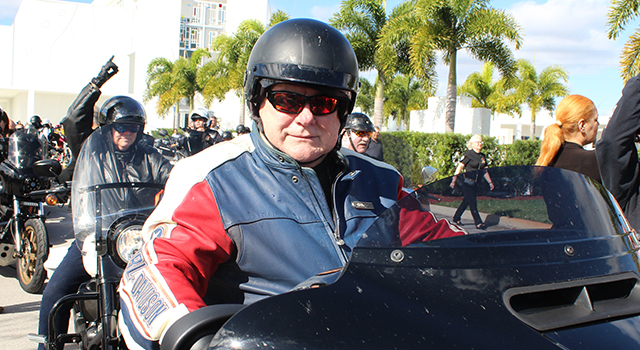By Ana Rodriguez Soto - The Archdiocese of Miami
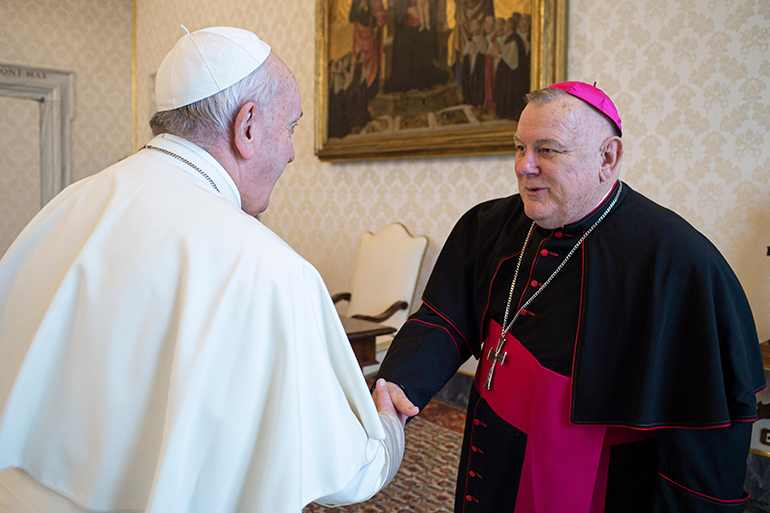
Photographer: Vatican Media
Meeting Pope Francis, Feb. 13, 2020: Archbishop Thomas Wenski greets the Holy Father before meeting with him along with the other bishops from Florida, Georgia, North and South Carolina.
MIAMI | Archbishop Thomas Wenski was born during a hurricane (Hurricane King in October 1950) and returned to Miami at the start of hurricane season (June 1, 2010). He already had a reputation as a fast-moving force of nature when he headed the Diocese of Orlando. So it was no surprise that Miami’s “native son” moved like the wind to make changes after his return.
He transferred many longtime pastors. He re-opened churches that had been closed a year earlier. He appointed the first Haitian priest — Msgr. Chanel Jeanty — and the first woman — Sister Elizabeth Worley, of the Sisters of St. Joseph of St. Augustine — to serve as chancellor, splitting the office’s duties between them: Msgr. Jeanty to handle canonical affairs, Sister Elizabeth to handle administration, with the title of chief operating officer.
In April 2012, Archbishop Wenski also launched the second synod in archdiocesan history, which took only 16 months to conclude, including a summer filled with listening sessions with Catholics in Miami-Dade, Broward and Monroe counties. The first synod had lasted three years.
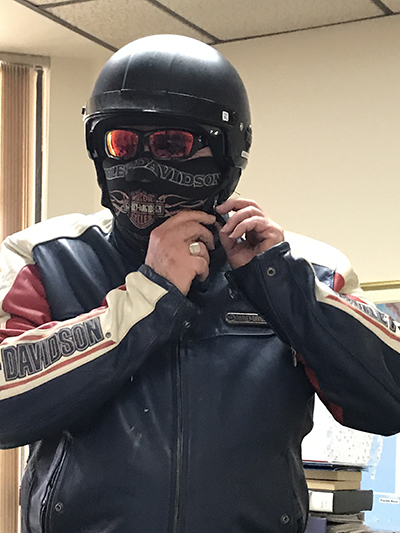
Photographer: FILE
Archbishop Thomas Wenski puts on his motorcycle mask and gear. A ride once a month, outside the city, he said, helps him de-stress and "clear the cobwebs" from his mind.
As he prepares to mark the 10th anniversary of his return, Archbishop Wenski took time to look back and answer some questions about his tenure so far in South Florida. Here’s what he had to say.
Q. Given that you were a priest and auxiliary bishop here in Miami, what were your priorities for the archdiocese after you arrived? What needed to get done administratively, spiritually, financially? Are you satisfied that you have done it? Where does more progress need to be made?
A. I spent seven years in Orlando before returning to Miami; but I was well acquainted with Miami, where I was ordained a priest 44 years ago. Except for the seven years in Orlando, I have served in the archdiocese as a parish priest, an auxiliary bishop and now for 10 years as its archbishop. There are always challenges — and in 2010, at the end of the Great Recession, the challenge was to inspire renewed confidence in the archdiocese’s stewardship of the gifts of the faithful.
With the help of Sister Elizabeth Worley, my chief operating officer, we worked to put into place “best practices” that required for some parishes a “change in culture,” as we introduced parish finance councils (not optional), tamper evident collection bags, and various financial controls. Michael Casciato, chief financial officer, played an important role with the archdiocesan finance council in assuring proper transparency and accountability in our parishes and other entities — for example, every three years, there is a financial review by an outside auditor.
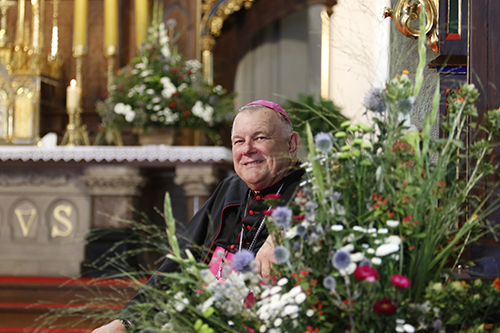
Photographer: ANA RODRIGUEZ-SOTO | FC
Archbishop Thomas Wenski looks out at the nave of St. Joseph Church in Krakow, filled with English-speaking young people from all over the world, as music ministers from the United Arab Emirates get the World Youth Day catechesis started.
Financially, we did well — some $90 million in debt paid off — up til the present COVID crisis which, besides a health crisis, is also an economic disaster. We will weather it well thanks to the continued support of our people and the policies put in place that, in 10 years, restored us to a healthy financial picture.
I was able to reopen or repurpose several of the parishes that had been closed during the Great Recession: St. Philip Neri is back without missing a beat as it were; St Robert Bellarmine is a mission of Corpus Christi; St. Cecilia is reopened and is also the site of a new Redemptoris Mater Missionary Seminary; St. Charles Borromeo is now Our Lady of La Vang Vietnamese Mission. These parishes as well as a revitalized youth and young adult ministry, a renewed marriage preparation program, the growth in the number of seminarians give witness to the spiritual vitality of this local Church.
Of course, there’s always more than could have been done — and more to do. I must say that I am proud of the priests during the many weeks we were “locked down” because of the pandemic. They worked tirelessly to remain close to the people, taking some great initiatives and coming up with creative programs. The “new normal” will uncover new challenges and demand of us new priorities, as well as creative solutions to the pastoral challenges of living in a “socially distant” world.
Q. Your first move was to call a synod — and you completed it in one year, with a three-year timetable for fulfilling its recommendations. Are you satisfied that the synod goals have been met? What, if anything, remains to be done? Is there another synod in our future?
A. The greater part of the synod goals have been achieved — or are in process. “Synod” is a churchy word for strategic planning, and what’s most important is not so much the “plan” as is the “planning.” Thinking strategically allows us to respond intelligently to the pastoral challenges before us, and not always being forced to haphazard improvising. In coming months, we will have to look hard at how we are “Church” and how we fulfill our mission to announce Jesus Christ in the new normal of a post pandemic world.
Q. What has been, for you, the most difficult moment of the past 10 years? And what has been the happiest, most fulfilling moment of the past 10 years?
A. I have difficult moments but none more difficult than suspending Masses with congregations in the last weeks of Lent and through the Easter Season. I have many happy moments. And when I get to the end of my tenure, I’ll tell you of my happiest moment — which I still hope lies ahead.
Q. What do you have planned for the future of the archdiocese — the next 10 years?
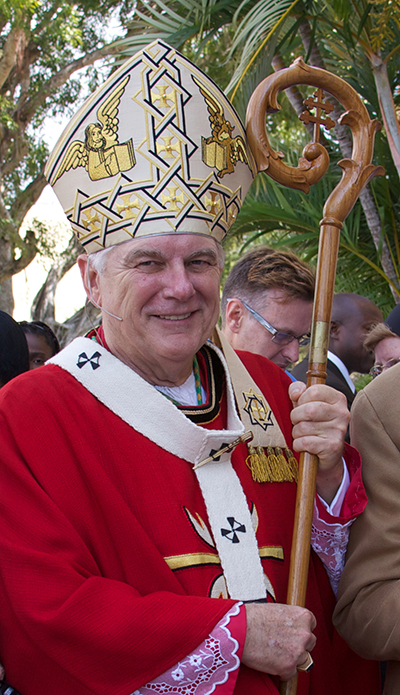
Photographer: Jonathan Martinez | FC
Archbishop Thomas Wenski stands outside the Cathedral of St. Mary after Palm Sunday Mass in 2013.
A. You know what they say, if you want to make God laugh, tell him about your plans.
Q. You said at one time, of your work all those years in Little Haiti, that it wasn’t easy but “it afforded me the opportunity to work among the poor and disenfranchised and to be in a sense ‘a missionary priest’ in my own backyard.” Now you often speak of missionary discipleship: How do you teach that, especially to lay people?
A. My years in Little Haiti — almost 20 years — have marked my life: When I dream, I often dream in Creole, reliving different moments of my time in Little Haiti. I also said my mission was to make the Church present to the Haitians (that were beginning to arrive in great numbers to South Florida in late 1970s) and to make the Haitians present to the Church. My episcopal motto is from St. Paul, “All things to all men.” I often remind people the Church is the Father’s house and the way to make people feel at home in their Father’s house is to speak their mother’s tongue.
Q. Here’s a partial quote from you in 2010: “Today, many people are angry and frustrated and it’s amazing how vehemently and often uncharitably people will disagree with something I say in my capacity as a bishop and teacher of the faith.” That anger has gotten much worse in the last decade and perhaps even in the past two months. How do you deal with that anger? Has it been more difficult to deal with here in Miami than in Orlando, perhaps?
A. Today, internet blogs, cable TV, and other social media have made “outrage” part of their business plan, so they hype “outrage” exasperating the divisiveness of our politics today. Such is the way of the world, but we cannot allow it to become the way of the Church, which is the “better” way of love. Bitter zeal never reforms; it only divides and sunders the unity of the Body of Christ.
Q. What do you do to cope, to take a mental health break for yourself amid the turmoil that just naturally seems to define Miami?
A. I like to ride my motorcycle. If I can get a day once a month or so to go on a long ride (away from urban traffic) I can clear the cobwebs from my mind.
Q. Catholic blogger Rocco Palmo compared you to a hurricane, “Hurricane Tom.” Do you feel you have lived up to that nickname in your administration of the archdiocese?
A. I was born in 1950 during Hurricane King that sideswiped West Palm Beach. I began my tenure on June 1, 2010, the beginning of hurricane season. Hurricanes have lots of energy. I still feel I have a lot of energy, energy that I can put to use not for destructive ends but for constructive ones.
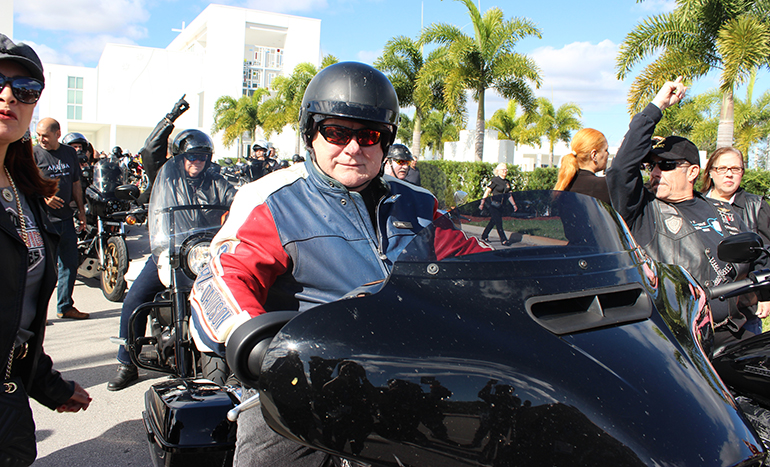
Photographer: IZZY RENNELLA | FC
With Doral's Our Lady of Guadalupe Church in the background, Archbishop Thomas Wenski prepares to take off for Peterson's Harley Davidson during his annual Motorcycle Ride to raise funds for St. Luke's Center, Feb. 23, 2020.
